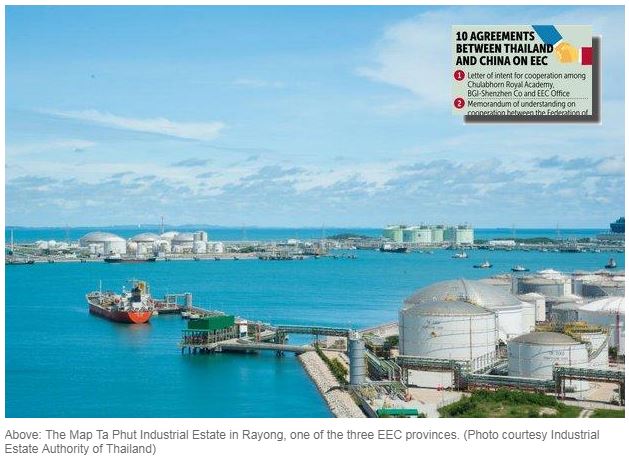Thailand: MoU slate to bring Chinese into EEC
The government will sign 17 memorandums of understanding (MoUs) with Chinese counterparts, expecting to capture new trade and investment for the flagship Eastern Economic Corridor (EEC) scheme.
“The aim is to connect the EEC to China’s One Belt, One Road initiative,” Industry Minister Uttama Savanayana said, referring to the scheme to link southern China with Southeast Asia and other regions.
Of the 17 MoUs, 10 will be subject to signing ceremonies by the ministry and the EEC Office on Friday and Saturday, when Chinese officials will visit Thailand with 504 high-ranking company executives.
 Ten agreements will invite Thai firms to be a part of future development projects.
Ten agreements will invite Thai firms to be a part of future development projects.
The remaining seven MoUs will fall under the Commerce Ministry’s purview, and they will be related to promoting business in the EEC and Thailand.
“All 10 MoUs are set for further investment in innovation, technology and digital industry,” Mr Uttama said.
Furthermore, Thailand and China will attend two events, the 6th Thailand-China Joint Committee on Trade, Investment and Economic Cooperation (JCT) on Friday and a joint forum called Thailand-China Business Forum 2018: Comprehensive Strategic Partnership through the Belt and Road Initiative and the EEC scheme.
The government will also meet Wang Yong, a member of China’s State Council, and Chinese investors.
Mr Uttama said the ministry will discuss EEC investment in the 11 targeted industries with Chinese counterparts.
“Chinese investors have expertise in robotics, aviation, medicine and equipment, biochemicals and agriculture, which complement the Made in China initiative, with a focus on any high-technology fields to upgrade Chinese industry,” Mr Uttama said. “The project is directly inspired by Germany’s Industry 4.0 scheme.”
He expects that all MoUs with China will result in developing local manpower for the 11 targeted industries and implement development of high technology and innovation to serve the 4.0 phase.
Kanit Sangsubhan, secretary-general of the EEC Office, said most Chinese investors are interested in the EEC scheme and most companies own high-tech innovations that can be competitive in the global market.
“They are a new wave of foreign direct investment,” Mr Kanit said. “Chinese companies are moving directly to Southeast Asia to capitalise on potential. In accordance with the One Belt, One Road initiative, China’s government has a policy to connect all countries to encourage operators to expand beyond China.”
He said the EEC will be the premier destination for Chinese investors.
Thailand is working on technological development in the manufacturing and industrial sectors, for which the government believes the relationship with China can be instrumental.
The EEC spans three strategic eastern provinces — Chachoengsao, Chon Buri and Rayong — which are positioned as a new special economic area for 11 targeted industries under the S-curve policy, intending to upgrade to next-generation industries through technology and innovation.
The 11 targeted industries are cars; smart electronics; affluent, medical and wellness tourism; agriculture and biotechnology; food; robotics for industry; logistics and aviation; biofuels and biochemicals; digital; medical services; and defence.
The government expects to stimulate investment flows to the corridor worth more than 1.7 trillion baht by 2021.
Source: https://www.bangkokpost.com/business/news/1526650/mou-slate-to-bring-chinese-into-eec


 English
English




